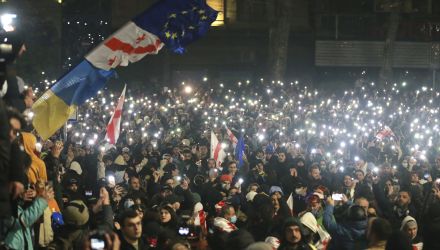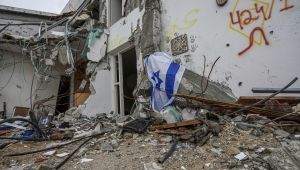BEIRUT -- Former Lebanese Prime Minister Saad Hariri’s broadside of sharp accusations against Hezbollah a few days ago is symptomatic of the entire Lebanese political scene and system -- spirited, adversarial, apocalyptic, mostly accurate in its accusations, dire in its predictions, but probably insignificant in its practical, immediate consequences. This is because two weeks ago, Hezbollah leader Hassan Nasrallah for his part made similar attacks against many (mostly Sunni) Salafist groups, the United States, Israel, conservative Arab regimes in the Gulf and others that he sees as in the same camp as Hariri’s March 14 alliance. He, like Hariri, accused his foes of equally evil deeds and treacherous intentions, whose consequences spell the ruin of the Arab world as we know it.
These intriguing figures, Hariri and Nasrallah -- one in exile the other in hiding for the last six years -- regularly issue their fire and brimstone-style warnings, threats, admonitions, offers and promises via the global digital media. Their chronically worried constituencies wonder every day if Lebanon will suffer another devastating war in the coming weeks or months, but they have no say in the decisions that determine war or peace. Both leaders’ words should be heeded carefully, because they have emerged as the spokesmen for the two major ideological camps of people across the Arab Middle East, plus much of Iran and Turkey in many ways, that are now deeply locked in an open war for the identity and control of state policies of around 500 million people in this region.
The fact that they both must remain in hiding and cannot openly take a stroll among their compatriots in their lovely capital city, Beirut, reflects at one level the seriousness and dangers of this war. They both fear being assassinated, and for good reason: Several of their predecessors and warriors in arms in fact have been assassinated in recent years. This also mirrors the intensity and the stakes of the war, which both sides see as a zero-sum contest in which one side will win and the other will disappear from history.
My guess is that neither Hariri nor Nasrallah fully captures the sentiments of the majority. Both their worldviews, values and lifestyles offer some appealing elements to Arab and other Middle Eastern nationals; but neither of them offers a social, nationalist and economic package that the majority of Middle Easterners would comfortably adopt.
Nasrallah and Hezbollah, with their Syrian and Iranian strategic/structural allies, offer resistance, respect, discipline, efficiency, liberation, deterrence, self-reliance and effective social services delivery systems that appeal to many; but they also represent to many others the promise only of perpetual warfare, recklessly determined unilaterally, along with the repulsive examples of Iranian-Syrian-style autocratic governance, bundled in an unspoken Shiite sectarian cloak. Many Lebanese deeply resent Hezbollah’s status as a heavily armed organization beyond the control of the state, and running its own foreign and war policies while disregarding the consequences for the rest of the country. There is much to love and fear about Hezbollah and its promises, depending on your vantage point in Lebanon and the region.
On the other hand, Hariri’s world is equally complex and paradoxical, at one enticing and frightening. With its rich tapestry of capitalism and pluralism, and national values captured symbolically in the spectacles of the Saudi and American worlds, Hariri’s ways offer materialistic allures that are blunted by the deep costs of social and class cleavages, where markets rule and governments cannot intermediate to plug the gaps in very basic needs -- food, shelter, jobs, electricity, to start with -- that plague perhaps hundreds of millions of people. Those who fear the Hariri promise do so in part also because they distrust governance that coddles and sometimes relies on fundamentalist Sunni-Wahhabi values as its foundation. They fear the Salafist wave that haunts them as much as Hariri’s compatriots fear the Shiite-Iranian wave that they see steadily approaching from the east.
Hariri and Nasrallah and their respective March 14 and March 8 movements -- and their wider supporters, allies, funders, apologists and armorers abroad -- represent both the vitality and the dysfunction of the Lebanese political governance system that has allowed itself repeatedly to become the main proxy gladiator’s arena for Middle Eastern and global powers. Lebanon offers many legitimate and available arenas where sensible politicians could negotiate durable power-sharing agreements that would allow Lebanon to achieve the full promise of its talented people, impressive culture, and strategic location. These include the parliament, the cabinet, the “three presidents”, and the National Dialogue. Yet these are used lightly and only occasionally.
So ideological divides in Lebanon and Middle East continue to widen and deepen, and move into the realm of armed combat, ethnic cleansing, and apocalyptic warnings about neighbors and foes that represent the devil’s ways. These warnings are issued by charismatic, powerful men in hiding, who mirror a modern Arab political culture that remains confounded by both its own bizarreness and its capacity for violence and self-destruction.
Rami G. Khouri is Editor-at-large of The Daily Star, and Director of the Issam Fares Institute for Public Policy and International Affairs at the American University of Beirut, in Beirut, Lebanon. You can follow him @ramikhouri.
Khouri, Rami. “Apocalyptic Words from Men in Hiding.” Agence Global, June 15, 2013





